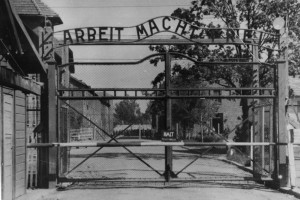 Almost 2 years after the International Auschwitz Council started the Auschwitz-Birkenau Foundation to raise the $120 million needed to fund a major renovation of the crumbling structures at Auschwitz, Germany has pledged to donate $80 million to the foundation over the next year. That’s fully half the $160 million dollar goal, an endowment that would support not only the emergency restoration work but would also generate enough yearly interest to provide steady maintenance funds.
Almost 2 years after the International Auschwitz Council started the Auschwitz-Birkenau Foundation to raise the $120 million needed to fund a major renovation of the crumbling structures at Auschwitz, Germany has pledged to donate $80 million to the foundation over the next year. That’s fully half the $160 million dollar goal, an endowment that would support not only the emergency restoration work but would also generate enough yearly interest to provide steady maintenance funds.
The United States has donated $15 million, Austria $8 million, and smaller sums have been pledged from a variety of European countries. Germany’s donation puts the goal, still distant, in sight. Up until now the Auschwitz-Birkenau State Museum has been financed almost entirely by its own revenues — proceeds from Holocaust survivor memoirs, documentaries and visitor’s fees — and by the Polish government. Donations from foreign governments and organizations provided only 5% of the museum’s budget in 2008.
The $10 million or so in yearly revenue from those combined sources hasn’t been sufficient to maintain a death camp that wasn’t exactly built to last in the first place. Add the stresses from constant tourism and from thieving bastards, and you have invaluable history on the brink.
Most urgently in need of repair are the 45 brick barracks of the women’s camp in the Birkenau section of the camp, Mensfelt said.
“They are in tragic condition due to the method of their construction and due to the ground water that is washing away the ground where they were built,” he said.
“They are crumbling away and could collapse at any time,” he added.
The barracks were built during the winter of 1941-42 by Soviet inmates, captured Red Army prisoners who were cruelly treated by the Germans and then executed, Mensfelt said.
Wooden barracks and the ruins of the gas chambers at Birkenau also need urgent repair, as they are crumbling because of harsh weather and sinking due to unstable ground.
Germany wants to ensure that this symbol of the Holocaust remain ever present, and that is why they’ve stepped up to the plate in such a large way. In the statement announcing the donation, German Foreign Minister Guido Westerwelle said “Germany acknowledges its historic responsibility to keep the memory of the Holocaust alive and to pass it on to future generations. Auschwitz-Birkenau is synonymous with the crimes of the Nazis. Today’s memorial recalls these crimes.”